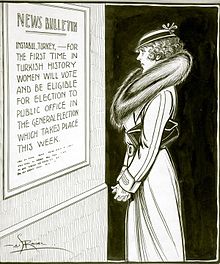
Back حق المرأة في الاقتراع في كندا Arabic কানাডায় নারীদের ভোটাধিকার Bengali/Bangla Frauenwahlrecht in Kanada German حق رأی زنان در کانادا Persian په کاناډا کې د ښځو د رايې حق Pashto/Pushto Sufrágio feminino no Canadá Portuguese


Women's suffrage in Canada occurred at different times in different jurisdictions to different demographics of women. Women's right to vote began in the three prairie provinces. In 1916, suffrage was earned by women in Manitoba, Saskatchewan, and Alberta. The federal government granted limited war-time suffrage to some women in 1917 and followed with full suffrage in 1918, at least, granting it on same basis as men, that is, certain races and status were excluded from voting in federal elections prior to 1960.[1]
By the close of 1922, all the Canadian provinces, except Quebec, had granted full suffrage to White and Black women, yet Asian and Indigenous women still could not vote.[2] In Newfoundland, at that time a separate dominion, women earned suffrage in 1925 for women not Asian and not Indigenous.[3] Women in Quebec, who were not Asian and not Indigenous,[4] did not gain full suffrage until 1940.[5]
Municipal suffrage was earned in 1884 to property-owning widows and spinsters in the provinces of Quebec and Ontario; in 1886, in the province of New Brunswick, to all property-owning women except those whose husbands were voters; in Nova Scotia, in 1886; and in Prince Edward Island, in 1888, to property-owning widows and spinsters.[6]
Asian women (and men) were not granted suffrage until after World War II in 1948, Inuit women (and men) were not granted suffrage until 1950, and it was not until 1960 that suffrage (in Federal elections) was extended to First Nations women (and men) without requiring them to give up their treaty status. Incarcerated women (and men) serving sentences fewer than two years in length were granted suffrage in 1993, and incarcerated women (and men) serving longer sentences were given the vote in 2002.[7]
- ^ "Right to Vote in Canada". The Canadian Encyclopedia.
- ^ Discover Canada - The Rights and Responsibilities of Citizenship. 2012.
- ^ Discover Canada - The Rights and Responsibilities of Citizenship. 2012.
- ^ Discover Canada - The Rights and Responsibilities of Citizenship. 2012.
- ^ Kalbfleisch, John. "Quebec, 1944: Finally, women earned the right to vote". Montreal Gazette. Montreal Gazette. Retrieved 17 June 2018.
- ^ Finley, Falconer & Newbolt 1920, p. 524.
- ^ Sauvé v. Canada (Chief Electoral Officer), 2002 SCC 68, [2002] 3 SCR 519